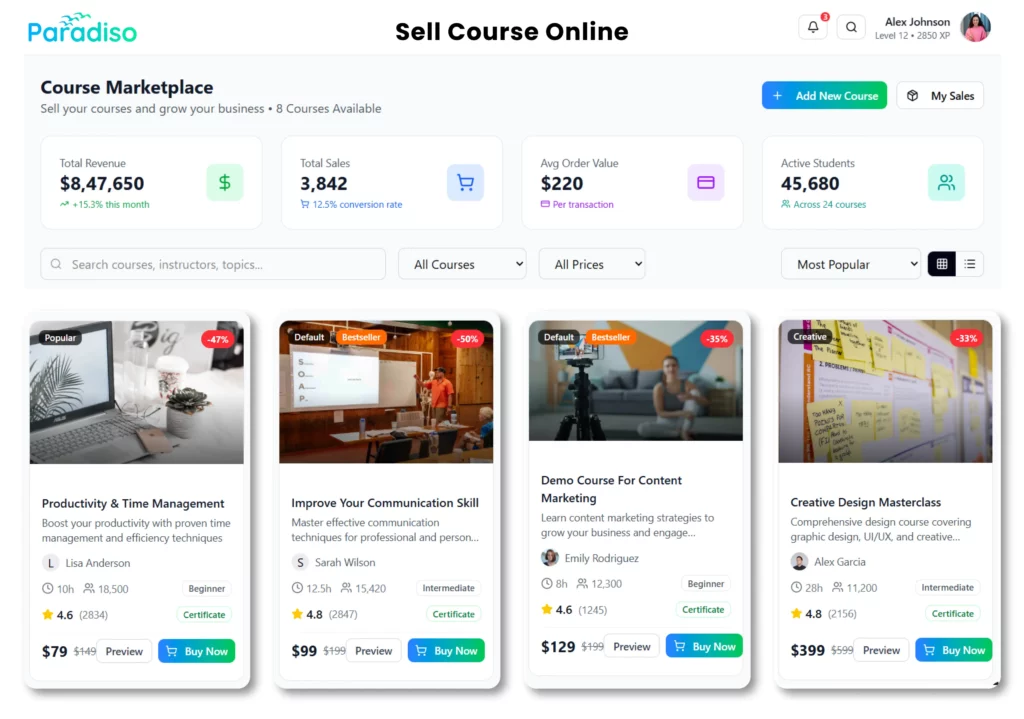In today’s fast-paced, technology-driven world, enterprises are constantly seeking innovative ways to upskill their workforce and stay ahead of the competition. Traditional training methods, while effective in the past, often fall short in addressing the unique learning needs of modern employees. Enter Adaptive Learning LMS—a revolutionary approach to corporate training that leverages artificial intelligence (AI) to deliver personalized, efficient, and impactful learning experiences. By combining AI-Driven Training with Adaptive Learning, organizations can foster Smarter Skill Development that aligns with both individual and business goals.
What is Adaptive Learning LMS?
An Adaptive Learning LMS (Learning Management System) is a platform that uses AI and machine learning algorithms to tailor training content to the specific needs of each learner. Unlike traditional LMS platforms that offer a one-size-fits-all approach, adaptive learning systems analyze user behavior, performance, and preferences to deliver customized learning paths. This ensures that employees receive the right content at the right time, maximizing engagement and retention.
The core of an Adaptive Learning LMS lies in its ability to dynamically adjust the difficulty, format, and pace of training materials based on real-time data. For example, if a learner struggles with a particular concept, the system can provide additional resources or simplify the content. Conversely, if a learner demonstrates mastery, the system can advance them to more challenging material. This level of personalization not only enhances the learning experience but also accelerates Skill Development.
The Role of AI-Driven Training in Modern Enterprises
AI-Driven Training is transforming the way organizations approach employee development. By harnessing the power of AI, enterprises can create highly efficient and scalable training programs that cater to diverse learning styles and skill levels. Here’s how AI is reshaping corporate training:
- Personalized Learning Paths: AI algorithms analyze individual performance data to create customized learning journeys. This ensures that each employee receives training that is relevant to their role, skill gaps, and career aspirations.
- Real-Time Feedback and Analytics: AI-powered LMS platforms provide instant feedback to learners, helping them identify areas for improvement. Additionally, administrators gain access to detailed analytics, enabling them to measure the effectiveness of training programs and make data-driven decisions.
- Automated Content Curation: AI can automatically recommend courses, videos, and resources based on a learner’s progress and preferences. This eliminates the need for manual content selection, saving time and ensuring that learners stay engaged.
- Predictive Insights: By analyzing historical data, AI can predict future skill requirements and recommend proactive training measures. This helps organizations stay ahead of industry trends and prepare their workforce for emerging challenges.
Why Adaptive Learning is Essential for Smarter Skill Development
In an era where skills become obsolete at an alarming rate, Smarter Skill Development is no longer a luxury—it’s a necessity. Adaptive learning plays a pivotal role in ensuring that employees acquire and retain the skills needed to thrive in a competitive landscape. Here’s why:
- Improved Engagement and Retention: Traditional training methods often fail to engage learners, leading to low completion rates and poor knowledge retention. Adaptive learning, on the other hand, keeps learners motivated by delivering content that is relevant, interactive, and challenging.
- Faster Time-to-Competency: By focusing on individual needs, adaptive learning reduces the time required to achieve competency. Employees can quickly acquire new skills and apply them in their roles, driving immediate business impact.
- Scalability and Flexibility: Whether you’re training a team of 10 or a workforce of 10,000, an Adaptive Learning LMS can scale to meet your needs. Its flexibility allows employees to learn at their own pace, making it ideal for remote and hybrid work environments.
- Cost-Effectiveness: By eliminating unnecessary training content and reducing the time spent on ineffective methods, adaptive learning helps organizations optimize their training budgets.
Key Features to Look for in an Adaptive Learning LMS
When selecting an Adaptive Learning LMS, it’s important to choose a platform that aligns with your organization’s goals and requirements. Here are some key features to consider:
- AI-Powered Personalization: Ensure the platform uses advanced AI algorithms to deliver personalized learning experiences.
- Comprehensive Analytics: Look for a system that provides detailed insights into learner performance, engagement, and skill development.
- Mobile Compatibility: A mobile-friendly LMS allows employees to access training materials anytime, anywhere.
- Integration Capabilities: The platform should seamlessly integrate with your existing HR and productivity tools.
- Content Variety: Choose an LMS that supports diverse content formats, including videos, quizzes, simulations, and microlearning modules.
Real-World Applications of Adaptive Learning LMS
Organizations across industries are leveraging Adaptive Learning LMS to drive Smarter Skill Development and achieve measurable results. For example:
- Healthcare: Hospitals use adaptive learning to train medical staff on the latest protocols and technologies, ensuring patient safety and compliance.
- Retail: Retail chains employ AI-driven training to onboard new employees quickly and improve customer service skills.
- Technology: Tech companies use adaptive learning to keep their workforce updated on cutting-edge tools and programming languages.
Conclusion
In a world where skills are the currency of success, Adaptive Learning LMS offers a game-changing solution for enterprises. By combining AI-Driven Training with personalized learning paths, organizations can achieve Smarter Skill Development that drives employee growth and business success. Whether you’re looking to upskill your workforce, improve engagement, or stay ahead of industry trends, an Adaptive Learning LMS is the key to unlocking your organization’s full potential.
Investing in an Adaptive Learning LMS is not just about staying competitive—it’s about future-proofing your workforce and ensuring long-term success. Ready to transform your training programs? Explore the power of adaptive learning today and take the first step toward a smarter, more skilled workforce.














